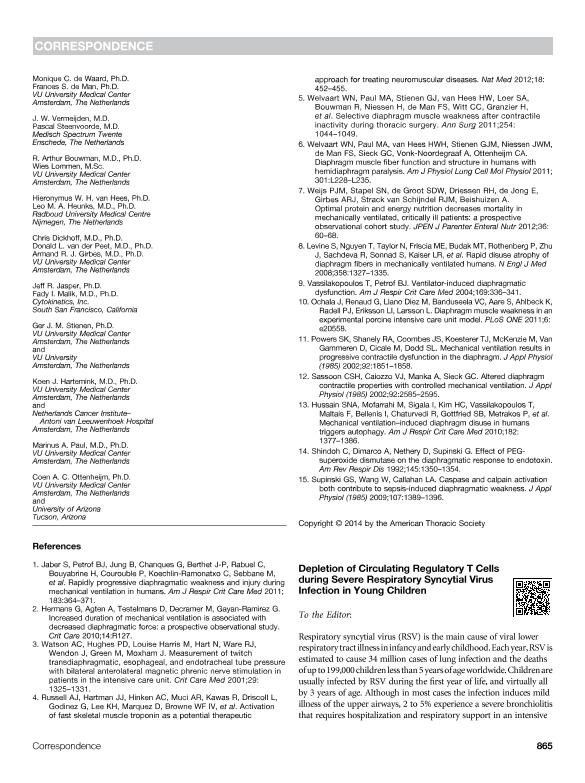Artículo
Depletion of circulating regulatory T cells during severe respiratory syncytial virus infection in young children
Raiden, Silvina Claudia ; Pandolfi, Julieta Belen
; Pandolfi, Julieta Belen ; Payaslian, Florencia Pía
; Payaslian, Florencia Pía ; Anderson, Mariana; Rivarola Martinez, Norma Gisele; Ferrero, Fernando Claudio; Urtasun, Marcela; Fainboim, Leonardo
; Anderson, Mariana; Rivarola Martinez, Norma Gisele; Ferrero, Fernando Claudio; Urtasun, Marcela; Fainboim, Leonardo ; Geffner, Jorge Raúl
; Geffner, Jorge Raúl ; Arruvito, Maria Lourdes
; Arruvito, Maria Lourdes
 ; Pandolfi, Julieta Belen
; Pandolfi, Julieta Belen ; Payaslian, Florencia Pía
; Payaslian, Florencia Pía ; Anderson, Mariana; Rivarola Martinez, Norma Gisele; Ferrero, Fernando Claudio; Urtasun, Marcela; Fainboim, Leonardo
; Anderson, Mariana; Rivarola Martinez, Norma Gisele; Ferrero, Fernando Claudio; Urtasun, Marcela; Fainboim, Leonardo ; Geffner, Jorge Raúl
; Geffner, Jorge Raúl ; Arruvito, Maria Lourdes
; Arruvito, Maria Lourdes
Fecha de publicación:
04/2014
Editorial:
American Thoracic Society
Revista:
American Journal of Respiratory and Critical Care Medicine
ISSN:
1073-449X
Idioma:
Inglés
Tipo de recurso:
Artículo publicado
Clasificación temática:
Resumen
Respiratory syncytial virus (RSV) is the main cause of viral lower respiratory tract illness in infancy and early childhood. Each year, RSV is estimated to cause 34 million cases of lung infection, and the deaths of up to 199 000 children under 5 years of age worldwide. Children are usually infected by RSV during the first year of life, and virtually all by 3 years of age. Although in most cases the infection induces mild illness of the upper airways, 2 to 5% experience a severe bronchiolitis which require hospitalization and respiratory support in an intensive care unit. These patients show later a high susceptibility to develop recurrent wheeze and asthma (1, 2). Our current understanding of the host response to RSV in humans remains rudimentary because most observations have been performed in animal models which do not adequately reflect the course of human infection (3, 4). There is compelling evidence, however, that the host immune response has a prominent role in the pathogenesis of severe RSV infection (3, 4). FOXP3+CD4+ regulatory T cells (Tregs) have emerged as the most important cells able to prevent potentially harmful immune responses (5). Observations made in animal models clearly demonstrated that Tregs play a critical role in controlling lung inflammation in the course of RSV infection (6-8). The presence and function of Tregs during human RSV infection have not been yet analyzed. We here show that severe RSV infection of young children induces the selective depletion of peripheral blood Tregs.
Palabras clave:
Foxp3
,
Syncytial Virus
,
Infants
,
Inflammation
Archivos asociados
Licencia
Identificadores
Colecciones
Articulos(INBIRS)
Articulos de INSTITUTO DE INVESTIGACIONES BIOMEDICAS EN RETROVIRUS Y SIDA
Articulos de INSTITUTO DE INVESTIGACIONES BIOMEDICAS EN RETROVIRUS Y SIDA
Articulos(INIGEM)
Articulos de INSTITUTO DE INMUNOLOGIA, GENETICA Y METABOLISMO
Articulos de INSTITUTO DE INMUNOLOGIA, GENETICA Y METABOLISMO
Articulos(OCA HOUSSAY)
Articulos de OFICINA DE COORDINACION ADMINISTRATIVA HOUSSAY
Articulos de OFICINA DE COORDINACION ADMINISTRATIVA HOUSSAY
Citación
Raiden, Silvina Claudia; Pandolfi, Julieta Belen; Payaslian, Florencia Pía; Anderson, Mariana; Rivarola Martinez, Norma Gisele; et al.; Depletion of circulating regulatory T cells during severe respiratory syncytial virus infection in young children; American Thoracic Society; American Journal of Respiratory and Critical Care Medicine; 189; 7; 4-2014; 865-868
Compartir
Altmétricas



